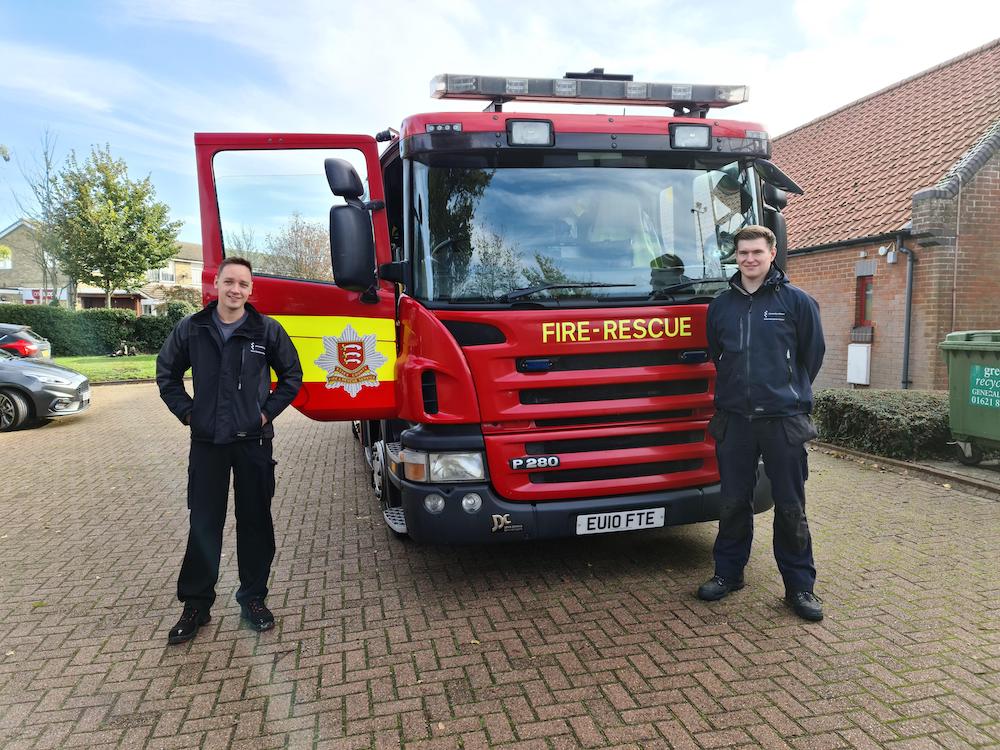Student Safety Week

On-call firefighters Matt and Jack from Wivenhoe Fire Station also work at the University of Essex, electrician Matt Baxter and plumber Jack Coates both work for the estate management section, that is until their pager sounds. They then immediately make their way to the fire station and respond to incidents in their local community. On-call firefighters are trained firefighters, on the front line, saving lives. Matt and Jack could be called out to anything from floods and fires to road traffic collisions or chemical spills, they are trained to deal with everything from extinguishing burning buildings to providing first aid. They must be prepared for any emergency and that is why they want to speak out on Student Safety Week.
Fire Safety Week
With new students settling in to their new homes and new routines and returning students getting back in to the swing of all things university, Essex County Fire and Rescue Service, as part of the national Fire Kills Campaign, is encouraging all students to have a think about their fire safety.
“With all the excitement and opportunity that university life brings, fire safety might not be at the top of your list of priorities,” says firefighter Matt Baxter.
“However, in amongst all your studying and socialising, taking a few moments to think about your accommodation, how you use it and what you might do to reduce any fire risks might save your life.”
Due to the pandemic, universities may look slightly different this year. Students may have to follow stricter rules including social distancing, less partying with big groups and socialising more in bubbles.
Even though we are in a pandemic and there will be changes, the one thing that will not change is that students will be cooking and other fire related risks will be present.
Home Office fire statistics show that of the 162 fires attended in the UK by fire and rescue services at student halls of residence in 2019/20, 66 per cent were started by cooking appliances.
Essex County Fire and Rescue Service has recently attended fires in student accommodation, some people needed to be rescued and others have been made homeless. The most common fires amongst students are cooking fires due to alcohol consumption.
By following Essex County Fire and Rescue Service’s top safety tips, you can help make sure that your student experience is a fire-safe one:
- Don’t leave cooking unattended and take extra care when frying with oil
- Don’t cook if you’ve been drinking alcohol, especially late at night
- If you smoke, make sure you put your cigarette out, right out. If you’re living on campus smoking is not permitted in buildings. Please keep a 5 metre distance when outside any university building
- Keep candles away from flammable surfaces or material that might burn – such as curtains, TVs, bath tubs – and never leave lit candles unattended. Candles are not permitted in any university building including accommodation
- Don’t overload plug sockets and switch off electrical equipment such as chargers, hair straighteners and blow dryers when not in use
- Make sure you know your escape routes and have a plan B in case your route is blocked
- In the event of a fire, get out, stay out and call 999
Matt added: “Each and every university or college has a person responsible for fire safety. If you spot a fire risk or have any concerns, then you should speak to them.”
Here is a video guide if living on campus:
Essex accommodation fire safety from University of Essex on Vimeo.
Things are a little different if an emergency occurs on campus. By calling our Campus Patrol or Security Officers first they can direct the emergency services to the exact site of the emergency without delay. For emergency contacts on campus and who to call in an emergency please follow this link.
https://www.essex.ac.uk/student/emergencies/emergency-contacts-at-colchester-campus
“Getting to know your flat-mates? Are they vulnerable? They may need assistance in an emergency,” said firefighter Jack Coates. “If so, get in contact with the university’s fire officer who can provide students with a Personal Emergency Evacuation Plan.”
There’s a No Smoking policy inside the accommodation and the use of portable heaters, halogen lamps or heaters, wax melters, candles, tea-lights, aromatic oil heaters, incense sticks or any other device which has a naked flame are prohibited in university buildings.
The university has strict rules on the use of certain electrical items. This is necessary to protect staff and students from the risk of fire and electric shock. Please take time to read this guidance, as it will help to ensure you do not have the unnecessary expense of having to replace unsuitable equipment.
“If you see Jack and I on campus and have any safety concerns please stop and chat to us,” said firefighter Matt Baxter. “If you need any further details on how to keep safe and information on what support is available to you, please check out the university’s student safety information.”
